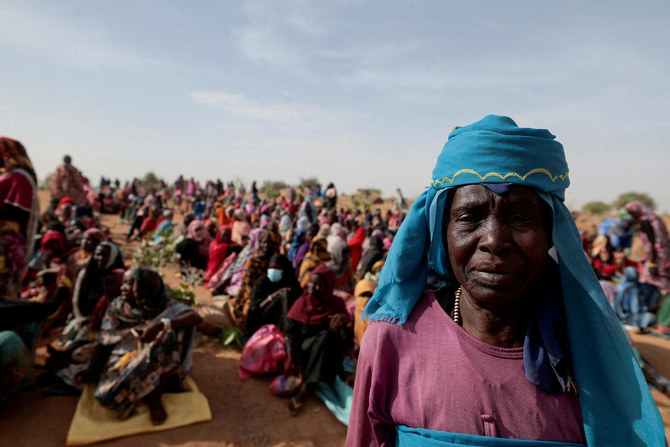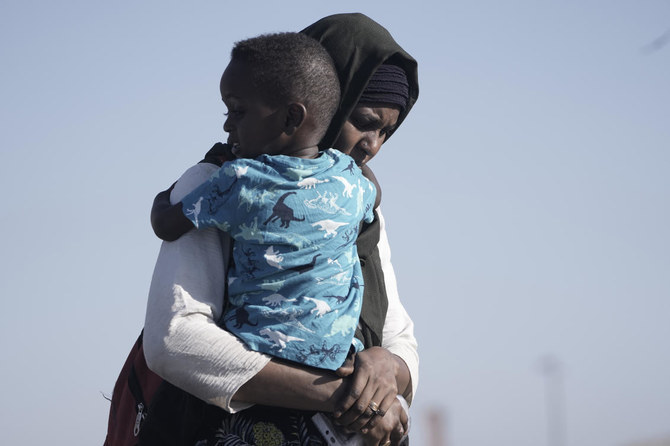KHARTOUM: Some 110 million people have had to flee their homes because of conflict, persecution, or human rights violations, the UN High Commissioner for Refugees says. The war in Sudan, which has displaced nearly 2 million people since April, is but the latest in a long list of crises that has led to the record-breaking figure.
“It’s quite an indictment on the state of our world,” Filippo Grandi, who leads the UN refugee agency, told reporters in Geneva ahead of the publication Wednesday of UNHCR’s Global Trends Report for 2022.
Last year alone, an additional 19 million people were forcibly displaced including more than 11 million who fled Russia’s full-scale invasion of Ukraine in what became the fastest and largest displacement of people since World War II.
“We are constantly confronted with emergencies,” Grandi said. Last year the agency recorded 35 emergencies, three to four times more than in previous years. “Very few make your headlines,” Grandi added, arguing that the war in Sudan fell off most front pages after Western citizens were evacuated.
Conflicts in the Democratic Republic of Congo, Ethiopia and Myanmar were also responsible for displacing more than 1 million people within each country in 2022.
The majority of the displaced globally have sought refuge within their nation’s borders. One-third of them — 35 million — have fled to other countries, making them refugees, according to the UNHCR report. Most refugees are hosted by low to middle-income countries in Asia and Africa, not rich countries in Europe or North America, Grandi said.
Turkiye currently hosts the most refugees with 3.8 million people, mostly Syrians who fled the civil war, followed by Iran with 3.4 million refugees, mostly Afghans. But there are also 5.7 million Ukrainian refugees scattered across countries in Europe and beyond. The number of stateless people has also risen in 2022 to 4.4 million, according to UNHCR data, but this is believed to be an underestimate.
Regarding asylum claims, the US was the country to receive the most new applications in 2022 with 730,400 claims. It’s also the nation with the largest backlog in its asylum system, Grandi said.
“One of the things that needs to be done is reforming that asylum system so that it becomes more rapid, more efficient,” he said.
The United States, Spain and Canada recently announced plans to create asylum processing centers in Latin America with the goal of reducing the number of people who trek their way north to the Mexico-US border.
As the number of asylum-seekers grows, so have the challenges facing them. “We see pushbacks. We see tougher and tougher immigration or refugee admission rules. We see in many countries the criminalization of immigrants and refugees, blaming them for everything that has happened,” Grandi said.
Last week European leaders renewed financial promises to North African nations in the hopes of stemming migration across the Mediterranean while the British government insists on a so-far failed plan to ship asylum-seekers to Rwanda, something UNHCR is opposed to. But there were also some wins, Grandi said, pointing to what he described as a positive sign in the European Union’s negotiations for a new migration and asylum pact, despite criticism from human rights groups.
Grandi also celebrated the fact that the number of refugees resettled in 2022 doubled to 114,000 from the previous year. But he admitted this was “still a drop in the ocean.”
110 million people forcibly displaced as Sudan, Ukraine wars add to world refugee crisis
https://arab.news/ysuk8
110 million people forcibly displaced as Sudan, Ukraine wars add to world refugee crisis

- More than 11 million fled Russia’s full-scale invasion of Ukraine
- Majority of the displaced globally have sought refuge within their nation’s borders
El-Sisi hails development of Egypt-EU relations

- El-Sisi and Kallas both stressed the need for full implementation of the Gaza ceasefire agreement to ensure regular and unrestricted flow of humanitarian aid into the enclave
CAIRO: Egyptian President Abdel Fattah El-Sisi on Saturday praised the development of his country’s relationship with the European Union, “emphasizing the importance of sustaining efforts to deepen cooperation, especially after relations were elevated to a comprehensive strategic partnership,” according to state media.
El-Sisi made the remarks during a meeting with the EU’s High Representative for Foreign Affairs and Security Policy and Vice-President of the European Commission Kaja Kallas.
El-Sisi and Kallas both stressed the need for full implementation of the Gaza ceasefire agreement to ensure regular and unrestricted flow of humanitarian aid into the enclave.
“During the meeting, Kallas expressed the European side’s appreciation for the ongoing cooperation with Egypt in various fields,” presidential spokesman Mohamed El-Shennawy said.
This cooperation was reflected in the holding of the first Egypt-EU summit in Brussels in October 2025, Kallas said.
The meeting addressed various other aspects of bilateral relations, with El-Sisi emphasizing the importance of implementing the outcomes of the first Egypt-EU summit and enhancing consultation and coordination on issues of mutual concern, particularly in political and security spheres, to support regional security and stability, according to the spokesman.
EU Special Representative for the Middle East Peace Process Christophe Bigot was also present at the meeting, along with Rosamaria Gili, the deputy managing director for the Middle East and North Africa at the European External Action Service; Egyptian Foreign Minister Badr Abdelatty; head of the EU delegation to Egypt Ambassador Angelina Eichhorst; Christine O’Dwyer, a member of Kallas’ cabinet; and other senior EU officials.
Abdelatty said on Thursday that Egypt expects the remaining €4 billion ($4.66 billion) of a previously announced macro-financial assistance package from the EU to be disbursed in three tranches by 2027, and that he hoped the first tranche would be released “in the coming days” after Cairo completed its fifth and sixth program reviews with the International Monetary Fund, Reuters reported.
In 2024, the EU announced a €7.4 billion funding package for Egypt, including €5 billion in concessional loans. The package also includes investments and grants, and was partly a response to Egypt’s worsening financial position following the Gaza war, Red Sea tension and the economic fallout from the war in Ukraine.















